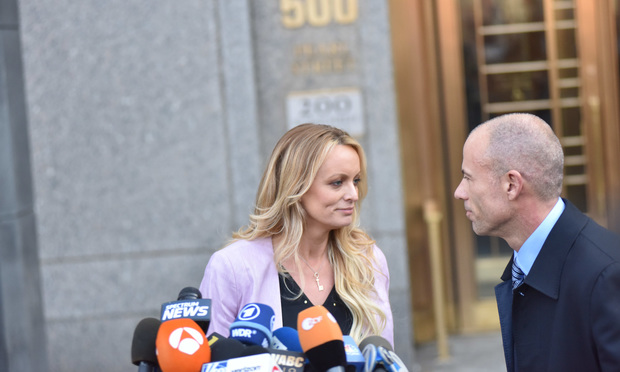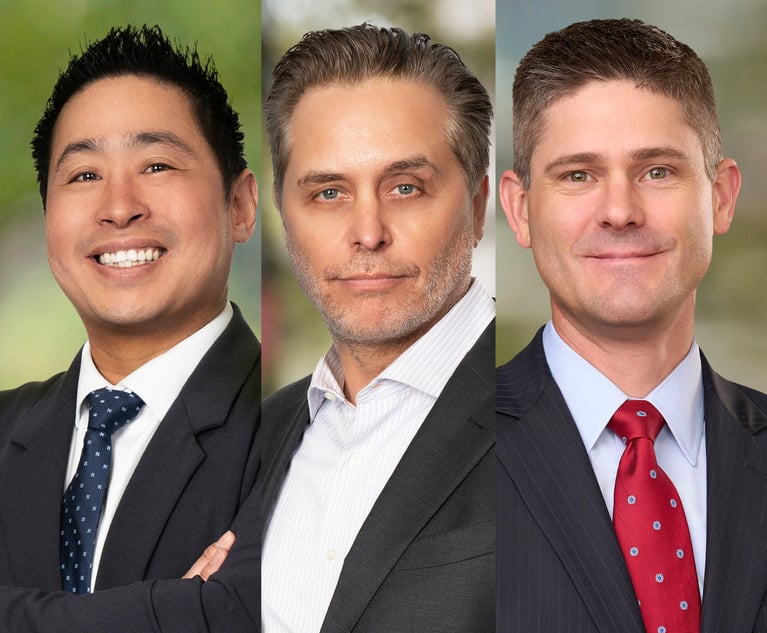Neither Trump Nor Avenatti Gets Cut of Stormy Daniels' $450,000 Settlement, Federal Judge Rules
In an eight-page order, U.S. District Judge Michael Watson of the Southern District of Ohio denies Trump's notice of registered foreign judgment seeking $293,052 of Daniels' settlement and tosses aside Avenatti's attorney lien seeking allegedly unpaid attorney fees from unrelated representation of Daniels.
June 04, 2020 at 08:29 PM
4 minute read
 Stormy Daniels and lawyer Michael Avenatti leave the Daniel P. Moynihan Courthouse in Manhattan. (Photo: David Handschuh/NYLJ)
Stormy Daniels and lawyer Michael Avenatti leave the Daniel P. Moynihan Courthouse in Manhattan. (Photo: David Handschuh/NYLJ)
Both President Donald Trump and prominent lawyer Michael Avenatti have been turned back, in one federal decision in Ohio, in their separate bids to grab chunks of a $450,000 settlement won by adult film actress Stormy Daniels in her 2018 false-arrest suit against the city of Columbus.
In an eight-page order, U.S. District Judge Michael Watson of the Southern District of Ohio denied Trump's notice of registered foreign judgment seeking $293,052 of Daniels' settlement, and tossed aside Avenatti's notice of attorney lien seeking allegedly unpaid attorney fees from his previous, unrelated representation of Daniels.
Watson, at the end of his order, also ruled that his clerk can now release the $450,000 to Daniels and her lawyers.
Trump entered the Ohio federal suit based on attorney fees he was awarded by a California federal judge in 2018 after he'd dismissed a Daniels-launched defamation suit against Trump.
In that suit, Daniels had sued Trump for defamation citing an April 2018 Trump tweet that labeled "a total con job" her statements about a man who allegedly threatened her and who she'd said was in some way linked to Trump, according to news reports and Watson's order. (Daniels' actual name is Stephanie Clifford.)
U.S. District Judge James Otero in California dismissed the suit on free-speech grounds and awarded the president $293,052 in attorney fees that haven't been paid, say news reports and Watson's opinion. Daniels has reportedly appealed attorney fees order in the California case.
But Watson, in his opinion handed down Tuesday, said Trump has no current interest in Daniels' $450,000 settlement because he was trying to collect based on an attorney fees award that has never been reduced to a final judgment. Moreover, Trump, represented by Beverly Hills-based attorney Charles Harder, was aware that Otero's clerk had attempted to make the award final and later realized that he was in error when doing so, said Watson.
"Trump argues that the 'clerk's conclusion [that he was in error] is erroneous,'" writes Watson, "and he has notified this court that he has moved to certify the attorney's fees order for registration in the underlying Central District of California case."
He also "seeks a stay in this court until his motion is resolved," Watson notes.
But "here, the plain language of the statute" that is relevant—which the judge said is 28 U.S.C. Section 1963, permitting a party to register certain federal judgments in other districts—"dictates the outcome," Watson says.
"Trump is glossing over a key requirement—how to register the foreign judgment in the first place," the judge also says, before adding that "because the Central District of California's Clerk of Court has rescinded its certification of judgment, there is no judgment to register under §1963."
Watson also denied Trump's motion for a stay.
On Thursday, Clark Brewster, Daniels' lawyer in the Ohio case, said in a phone interview that Trump "litigates aggressively in numerous venues and my discovery thus far"—he said, based on handling multiple matters involving Daniels and Trump—"is that that cases I've had involving him and Ms. Daniels are meritless."
"In this case," involving the attempt to collect money from Daniels' Columbus settlement, "if they [Trump and Harder] don't know the difference [between] what a judgment is or not, based on pretty simply black letter law, you can imagine how difficult it is where there is a complex case."
In turning back Avenatti's claim to part of Daniels' $450,000, Watson said Avenatti had withdrawn his notice of attorney lien in the Ohio case because he'd begun arbitrating with Daniels over his allegedly owed attorney fees. But, explained Watson, he still argues in Ohio for a stay of his claim in Watson's court until the arbitration is finished.
"Although Avenatti argues that he is entitled a portion of the settlement funds 'under California law,' he fails to cite to any legal support justifying his request for a stay of this case until he and plaintiff finish arbitration," Watson wrote.
Avenatti could not be reached for comment Thursday.
This content has been archived. It is available through our partners, LexisNexis® and Bloomberg Law.
To view this content, please continue to their sites.
Not a Lexis Subscriber?
Subscribe Now
Not a Bloomberg Law Subscriber?
Subscribe Now
NOT FOR REPRINT
© 2025 ALM Global, LLC, All Rights Reserved. Request academic re-use from www.copyright.com. All other uses, submit a request to [email protected]. For more information visit Asset & Logo Licensing.
You Might Like
View All
White & Case KOs Claims Against Voltage LLC in Solar Companies' Trade Dispute

Goodwin Procter Relocates to Renewable-Powered Office in San Francisco’s Financial District

Polsinelli Picks Up Corporate Health Care Partner From Greenberg Traurig in LA

Perkins Coie Lures Former Longtime Wilson Sonsini Tech Transactions Partner
Trending Stories
Who Got The Work
J. Brugh Lower of Gibbons has entered an appearance for industrial equipment supplier Devco Corporation in a pending trademark infringement lawsuit. The suit, accusing the defendant of selling knock-off Graco products, was filed Dec. 18 in New Jersey District Court by Rivkin Radler on behalf of Graco Inc. and Graco Minnesota. The case, assigned to U.S. District Judge Zahid N. Quraishi, is 3:24-cv-11294, Graco Inc. et al v. Devco Corporation.
Who Got The Work
Rebecca Maller-Stein and Kent A. Yalowitz of Arnold & Porter Kaye Scholer have entered their appearances for Hanaco Venture Capital and its executives, Lior Prosor and David Frankel, in a pending securities lawsuit. The action, filed on Dec. 24 in New York Southern District Court by Zell, Aron & Co. on behalf of Goldeneye Advisors, accuses the defendants of negligently and fraudulently managing the plaintiff's $1 million investment. The case, assigned to U.S. District Judge Vernon S. Broderick, is 1:24-cv-09918, Goldeneye Advisors, LLC v. Hanaco Venture Capital, Ltd. et al.
Who Got The Work
Attorneys from A&O Shearman has stepped in as defense counsel for Toronto-Dominion Bank and other defendants in a pending securities class action. The suit, filed Dec. 11 in New York Southern District Court by Bleichmar Fonti & Auld, accuses the defendants of concealing the bank's 'pervasive' deficiencies in regards to its compliance with the Bank Secrecy Act and the quality of its anti-money laundering controls. The case, assigned to U.S. District Judge Arun Subramanian, is 1:24-cv-09445, Gonzalez v. The Toronto-Dominion Bank et al.
Who Got The Work
Crown Castle International, a Pennsylvania company providing shared communications infrastructure, has turned to Luke D. Wolf of Gordon Rees Scully Mansukhani to fend off a pending breach-of-contract lawsuit. The court action, filed Nov. 25 in Michigan Eastern District Court by Hooper Hathaway PC on behalf of The Town Residences LLC, accuses Crown Castle of failing to transfer approximately $30,000 in utility payments from T-Mobile in breach of a roof-top lease and assignment agreement. The case, assigned to U.S. District Judge Susan K. Declercq, is 2:24-cv-13131, The Town Residences LLC v. T-Mobile US, Inc. et al.
Who Got The Work
Wilfred P. Coronato and Daniel M. Schwartz of McCarter & English have stepped in as defense counsel to Electrolux Home Products Inc. in a pending product liability lawsuit. The court action, filed Nov. 26 in New York Eastern District Court by Poulos Lopiccolo PC and Nagel Rice LLP on behalf of David Stern, alleges that the defendant's refrigerators’ drawers and shelving repeatedly break and fall apart within months after purchase. The case, assigned to U.S. District Judge Joan M. Azrack, is 2:24-cv-08204, Stern v. Electrolux Home Products, Inc.
Featured Firms
Law Offices of Gary Martin Hays & Associates, P.C.
(470) 294-1674
Law Offices of Mark E. Salomone
(857) 444-6468
Smith & Hassler
(713) 739-1250






